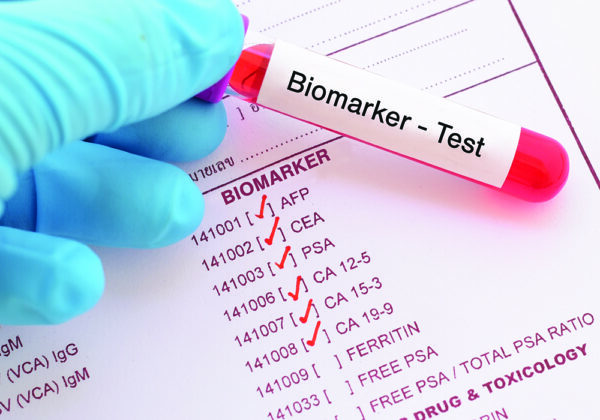What is biomarker testing?

biomarker test
The process of searching for genes, proteins, and other materials (biomarkers or tumor markers) that may provide insight into cancer or any disease is known as biomarker testing. In body fluids and tissues, it entails examining and quantifying particular chemicals, genes, proteins, cells, or other biological indicators.
Biomarkers are quantifiable indications of diseased states, typical physiological processes, or reactions to treatment interventions. For this reason, they are significant for many different aspects of healthcare, from disease evaluation and prognosis forecasts to treatment selection, disease development and treatment response monitoring.
Biomarker testing can be applied in a variety of ways and more often than not, materials for this procedure are obtained via blood sample collection. There are several examples of biomarker tests. They include:
- Cancer Biomarkers: Blood serum levels of the prostate-specific antigen (PSA) are utilized as a biomarker for prostate cancer screening, diagnosis, and therapy response monitoring. Also, treatment decisions for breast cancer are guided by indicators such as gene amplification status and HER2/neu protein expression. Last but not least, screening for KRAS gene mutations aids in predicting how colorectal cancer patients will react to anti-EGFR treatments.
- Cardiovascular Biomarkers: Blood levels of cardiac troponin are indicators for the diagnosis of myocardial infarction, a heart attack, and other symptoms of acute coronary syndrome (ACS). Increased troponin levels signify injury to the heart. Furthermore, worse outcomes are linked to elevated BNP levels, which signify cardiac stress.
- Genetic Biomarkers: Testing for mutations in the BRCA1 and BRCA2 genes can identify people at a higher risk of breast and ovarian cancer. These biomarkers assist risk assessment and might direct risk-reducing operations and other preventative interventions. Additionally, genetic testing for HIV treatment resistance mutations influences the choice of antiretroviral medication.
- Neurological Biomarkers: Neuroimaging or cerebrospinal fluid (CSF) biomarkers, such as tau and amyloid-beta proteins, are employed in diagnosing and following up Alzheimer’s disease. Potential biomarkers for diagnosing and following the course of Parkinson’s disease include alpha-synuclein levels in CSF or blood plasma.
Biomarker testing methods differ based on the kind of biomarker being examined and its intended use. Molecular tests (PCR, sequencing), imaging modalities (MRI, PET scans), immunoassays (ELISA, etc.), and biochemical studies are widely used approaches.
Significance of Biomarker Testing
For a variety of reasons, biomarker testing is essential to contemporary healthcare.
- Early Disease Detection: Biomarker testing frequently makes early illness diagnosis possible, before the appearance of clinical symptoms. This early diagnosis improves results and prompts action. For example, in breast cancer, early detection of the BRCA 1 and 2 mutations helps in the management and positive outcomes for patients.
- Personalized Medicine: Precision medicine spares patients from treatments that are unlikely to be beneficial while selecting the ones that are most likely beneficial for them based on biomarkers and other testing. Under this method, a patient’s medical care is customized according to their unique body’s makeup of proteins, DNA, and other materials. For example, Hormone treatment may be beneficial for patients with breast cancer that is PR-positive or ER-positive. As a result, precision diagnosis enables medical professionals to pinpoint patients who would benefit from hormone therapy, resulting in more individualized and efficient care.
- Prognosis Prediction: Biomarkers shed light on prognoses because they can forecast the chance of a disease’s development, recurrence, or reaction to therapy. Clinicians can use this information to monitor patient outcomes and adjust treatment regimens. An elevated PSA, for instance, often denotes the possibility of prostate cancer. This information aids in deciding the cancer patient’s course of therapy.
- Infectious Diseases: Biomarkers, which include microbial antigens, antibodies, and nucleic acids, are utilized in the diagnosis of infectious disorders. They also direct treatment choices and epidemiological monitoring. For instance, polymerase chain reaction (PCR) and other nucleic acid amplification tests (NAATs) are frequently used to identify viral, bacterial, or fungal DNA/RNA in clinical specimens, assisting in the identification of illnesses such as COVID-19, HIV, hepatitis, and TB.
Challenges with biomarkers
Biomarker testing has a lot of potential, but it also has drawbacks.
First, much biomarker testing requires expensive lab equipment and specific analytical methods. For instance, mass spectrometry, proteome profiling, and genomic sequencing are highly complicated processes that need costly equipment and skilled workers to carry out and analyze the findings.
Another challenge that comes with biomarker testing is difficulty in interpreting testing data, as there may be other factors that contribute to disease progression. To mitigate this, researchers and physicians typically combine monitoring and testing approaches.
Finally, biomarker testing – in particular, certain types of cancer biomarker testing – remains relatively new, depending on the biomarker that is being accessed. For example, while Thymidine Kinase 1 is noted for the key role it plays in cancer cell proliferation, widespread biomarker testing for TK1 has yet to be adopted due to its novelty.
Nevertheless, there is hope for overcoming these obstacles and expanding biomarker testing through further study and technical developments with time. Artificial intelligence applications, point-of-care testing, and patient-centric techniques are also some of the future possibilities in biomarker research.
Final words
Some may say that modern medicine is built on biomarker testing, and there is some truth to it. While biomarker tests are only a small fraction of what physicians, researchers, and healthcare providers are working on uncovering and refining, they do offer us a vital new understanding of the biology, prognosis, and response to therapy of diseases. With the right testing approach and methods, global patient outcomes can be improved, and disease management paradigms can be revolutionized.







